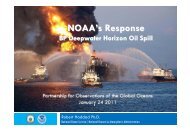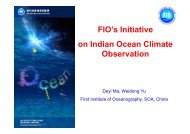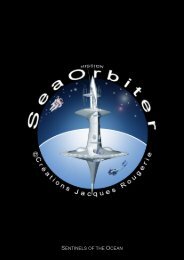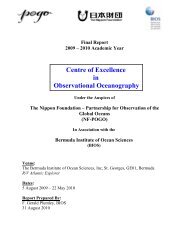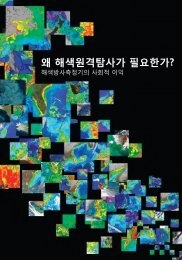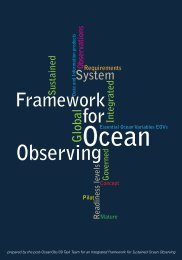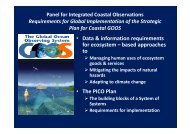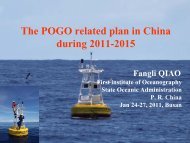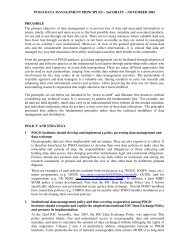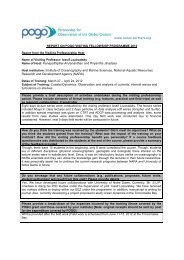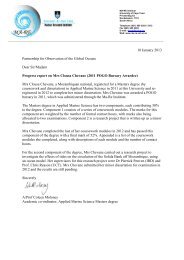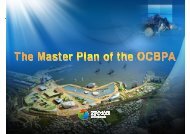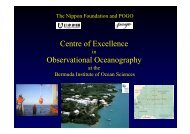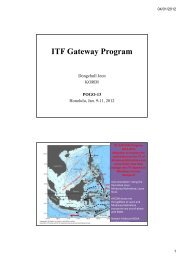policy.pdf
policy.pdf
policy.pdf
You also want an ePaper? Increase the reach of your titles
YUMPU automatically turns print PDFs into web optimized ePapers that Google loves.
The default is the status quo• The ocean is LOWPRIORITY comparedwith schools, health,economy.• Legislative time is inshort supply.• Change only occurs ifpressure is applied.Most people only experience themarine environment during theirsummer vacation
What causes <strong>policy</strong> change?• Emergency situations• Voter pressure• Treaty obligations or otherinternational imperative• Lobbying• Incentives• New scientific knowledge• Societal demand• Commercial advantage• Genuine concern fromindividual politicians• In UK the influence of themedia is substantive
Recent <strong>policy</strong> developments inEurope and the UK• European Marine Strategy Directive• European Maritime Policy• Parliamentary inquiry ‘Investigating theOceans’– Marine Science Coordinating Committee– UK Marine Science Strategy• UK and Scottish Marine Bills
Marine Thematic Strategy•Common principles for problems shared by different regions•Regionalised approach (marine regions)•Ecosystem based approach to management•Achieve “good environmental status” of the EU’s marine waters by 2021Implementation at regional level (multi Member State coordination)with EC approval of basic stages•Description and assessment of current environmental status•Determination of good environmental status•Establishment of environmental targets•Monitoring programme•Programme of management measures towards good environmental status
European Marine FrameworkStrategy Directive• This is becoming the PRIMARY DRIVERfor targets and objectives.• Applies to all waters claimed by EUMember States• Sub-regions are NE Atlantic, Baltic, Medand Black sea – very similar to existingOSPAR boundaries.•See http://ec.europa.eu/environment/water/marine/index_en.htm
Marine Framework StrategyDirective.• Seeks to protect, preserve and where possiblerestore biodiversity by 2020• Will deliver the environmental pillar of the EUMaritime Policy• Member States must take measures to achieve‘Good Environmental Status’ by 2020• Overlaps with Water Framework Directive butmore holistic and recognises role of MarineProtected Areas
Maritime Policy Green Paper(Consultation 2006-07)Marine Thematic Strategy Directive(Negotiation 2006-07)Habitats DirectiveWater Framework DirectiveBirds DirectiveNitrates DirectiveUrban Waste Water Treatment DirectiveBathing Water DirectiveShellfish DirectiveEuratom TreatyCommon Agricultural PolicyCommon Fisheries Policy
Policy development : MaritimePolicy“Marine and maritime science has a huge roleto play in the formulation of the measures thatwill contribute to increased competitivenessand sustainable economic growth and jobs inthe European knowledge-based economy.”Commissioner Joe BorgFisheries and Maritime AffairsEurOCEAN 2007, Aberdeen
A dynamic maritime economy inharmony with the marineenvironment, supported by soundmarine scientific research andtechnologyThe oceans and seas bound Europe,but they also bind it together.José Manuel Barroso, EU President
Research Community influence2006Galway 2004Blue Book&Action PlanOct 2007Brussels 2004Aberdeen 2007EU Parliament 2005From Green to BlueBrussels 2007Bremen 2007
EU Maritime Policy•EU Marine and Maritime researchtechnology and innovation strategy•Sustained funding for observatories•European Marine Observation and DataNetwork•Greater collaboration on infrastructure•Knowledge transfer/industrialengagement measures•Outreach and public engagement•Marine community to speak with ‘singlevoice’ to <strong>policy</strong> makers – build networksand partnerships
House of Commons Inquiry‘Investigating the Oceans’• MP’s Select Committee for Science & Technology Report publishedOctober 2007, widely welcomed by UK marine community.• A key recommendation was to set up a Marine Agency to overseemany aspects of marine science and technology, including provisionof funding for operational oceanography• In January 2008 the Government’s response instead proposed tostrengthen an existing coordination mechanism the ’Inter AgencyCommittee on Marine Science and Technology (IACMST); replacingit by a Marine Science Coordination Committee (MSCC)• The MSCC is currently in the early stages of formation (DEFRA,NERC, Scottish Office, MoD and others).• Responsible for writing the [first] UK Marine Science Strategy.
Oceans Policy (Oceans Act 1997)Sustainable development of oceans resourcesOceans PolicyCare for, understand and use our oceans wisely – integratedecosystem based planning &managementUS Commission on Ocean Policy (Oceans Act 2000)Protecting the marine environment while sustaining the vitalrole oceans and coasts play in our lives and national economyEU Marine Thematic Strategy Directive &Maritime Policy Green Paper/Blue BookProtect our seas and oceans to ensure that human activitiescan be carried out in a sustainable mannerUK Marine Science Strategy –2009?
Well over halfofthe UKis underthe seaThe total extent of UK waters (UKCS designated area and territorial waters) is approximately 867,400 km 2 ,of which 161,200 km 2 is territorial waters (including around Rockall) and the offshore area 706,200 km 2 .The land area is 244,820 km 2
Marine BillIntended to bring more coherence towards•Marine fisheries (mostly inshore)•Marine spatial planning•Licensing marine activities•Marine nature conservation(pervasive theme of “Ecosystem based management”)New marine management organisation
•Landuse•Tourism•Oil &Gas•Mariculture•CoastalDefence•Ports &Navigation•MilitaryActivities•Culture•Conservation•Dredging &Disposal•SubmarineCables•Fishing•RenewableEnergy•MarineRecreation•MineralExtraction
Marine and Coastal Access Bill• Consultations throughout 2006/7• Announced in Queen’s Speech 3December 2008• 4 December – introduced to the House ofLords, 15 December received 2 nd reading.• It will start Committee Stages early in 2009
Key Areas covered by Marine &Coastal Access Bill• Sets up a Marine Management Organisation• Creates a strategic marine planning system• Will support seabed mapping through Cefas• Will streamline marine licensing• New tools for Marine Nature Conservation• Strengthened fisheries management and enforcement• Focus through MMO on environmental data andinformation• Better management for migratory & freshwater fisheries.• Coastal access provision• Use of integrated coastal zone management•See www.defra.gov.uk/marine/legislation/index.htmhttp://www.defra.gov.uk/marine/legislation/key-docs.htm
Issues for Research Providers• Huge amount of baseline assessment work needed innext decade, esp. to provide evidence base for MarineConservation Zones.• Massive increase required in seabed mapping.• Entry of the terrestrial planning sector - staff, expertise,legacy attitudes, into ‘our’ patch…• Chance of litigation over refusals to grant licences willcall on marine science community to provide evidence .• Limited funding may lead to focus on <strong>policy</strong>-relatedscience closer to the shore than we are used to.• Requirement for sustained long-term monitoring andassessment greater than ever, associated datamanagement and access issues.• Questions about data access, charging regimes, ‘collectonce, use many times’, cross-border collaboration.• Will Marine Conservation Zones be ‘no-go’ areas forscience?
Lessons for the Community• Marine spatial planning is here to stay.• The UK & Scottish Marine Bills required extensiveconsultation and are still only first steps towardssustainable management of the sea.• The European overview gives focus to objectives, the‘regional seas’ concept forces collaboration.• Informed science <strong>policy</strong> requires data that is properlycompiled and curated.• We need much better seabed mapping.• Marine management objectives will clash with flawedsystems such as the Common Fisheries Policy.• Important to join-up terrestrial and marine planning,particularly at the coastal zone interface.• Operational Oceanography will evolve further.• Online data access with layered geographicalinformation systems will greatly enhance the ability toperform marine resource management.
Where science can help• Knowledge Gaps• The non-linearities (tipping points” inthe marine system• Contribute to defining “GoodEnvironmental Status” for effectivemonitoring and assessment• Designing and reviewing effectivemonitoring programmes• The fourth dimension of MarineSpatial Planning – time variability• Modelling tools for MSP, ecosystembased management• The marine system in a wider earthsystem context• Horizon scanning (e.g. oceanacidification case)• Route for broadly based independentscience input (IPCC for the seas)• “Self organisation of marine sciencein the UK, Europe andInternationally)North Sea bloom, July 2006 SeaWIFS, NASA
• Thank you for your attention• Contact jkwo@noc.soton.ac.uk• http://www.noc.soton.ac.uk/nmco



